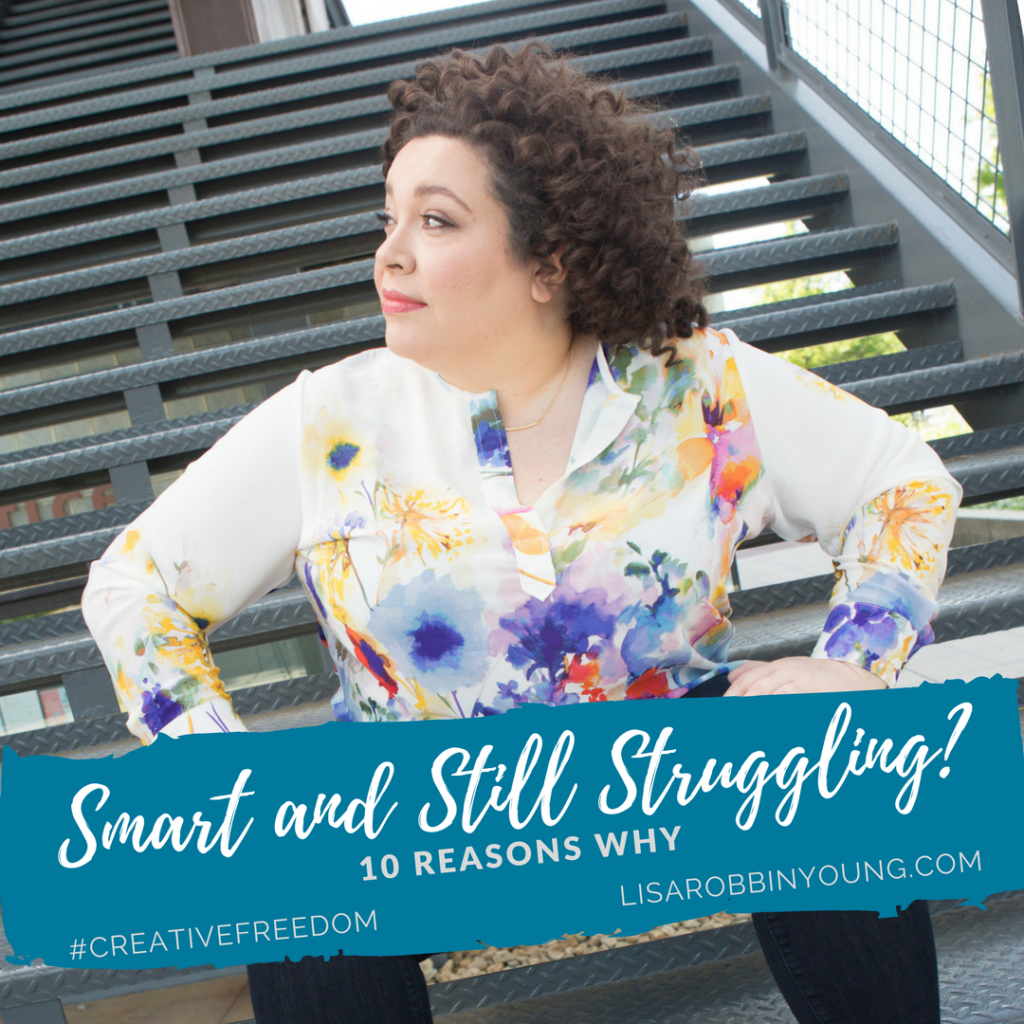My youngest son knows he's gifted when it comes to building with Lego bricks. He can follow directions like nobody's business. He'll tell me when I've accidentally skipped a step. He'll even build new designs straight "from his brain", as he likes to say. They're so good I often post them to instagram so my fans and followers can see his mad building skills.
When it comes to bricks, he knows he's a genius. But when I tell him he's also smart in other ways, he balks.
He's quick to point out all the things he doesn't do well. Like handwriting, or math, and his social skills could use some sharpening, too.
He's 11.
Fusion Creatives (like me) have a wider breadth of knowledge, but they don't necessarily go as deep as a Chaotic or a Linear might. That can often cause us to think we're "not smart" - especially when compared to others. Yet, being able to see how all the pieces work together gives us a unique advantage that Chaotics only dream about (Linears don't dream about it, they just hire it out.). Likewise, Chaotics are gifted with a focus on the experience of something, while Linears are gifted with the ability to understand, formulate, and implement systems and processes (Not sure about your type? Take my free quiz here).
Like I said in my book, we're all creative. In that same vein, we're all smart. It's just a matter of discovering your zone of genius. For my 11 year old, that's Legos, empathy, and compassion. He is incredibly good at caring for people he cares about. He understands feelings. Pretty smart for an 11 year old. Heck I know some middle-agers who could learn a thing or two from him!
In all my years of working with creative entrepreneurs, however, I find the same pattern coming up over and over. Time and again, I say that six figures is a goal that every creative entrepreneur needs to strive for (for the health and well being of their business and themselves), but I still see smart, brilliantly gifted creatives struggling to make a living wage doing what they love. Even some of those that do hit the six figure mark are still struggling. If you're keeping score, I've seen it with millionaires, too. It's just more zeroes on the end of the problem.
But why? When it's so obvious that you're talented, and maybe even smarter than your industry leader, why do you keep struggling?
Disclaimer: This list makes a few assumptions. I'm no medical practitioner, so I'm making the assumption here that you're an otherwise healthy individual. I'm also assuming you have comparable levels of access and ability as your peers. We're essentially dealing with the "inner game" here, not the socio-economic factors that are often beyond our control. Often there are mental and situational gymnastics at play that are actively (albeit subconsciously) sabotaging your success. Here are 10 reasons I've seen show up in one form or another with my clients (and myself).
I wonder if they might apply to you.
Do I really need to say more than this?
Okay. Fine.
You're easily distracted - either by big ideas, the "shoulds" of others, FOMO, or you've just got too much on your plate for you to focus on one thing long enough to see success. Something has to change.
Yes, I get that sometimes that's easier said than done. That's why I created Dreamblazing and built A-Club around the concept of a 30-hour project. What are you willing to invest 30 hours in? That's about an hour a day for a whole month to move closer to your dreams. Most of us can handle that - and see real progress to boot! It may be slower going, but as Confucius said, it doesn't matter how slow you go so long as you keep moving!
As a Fusion creative, I find it challenging to pick just one thing and stay focused relentlessly on it. I get bored or frustrated. I mean, maybe SOME people can sit for six hours and work on the same thing that whole time, but not me. I need to get up, move, and put my mind on something else. It's in that task shifting that I often get new perspectives on my big projects that help me refine my focus.
Is it less efficient? Maybe. There are different definitions of multi-tasking and task switching. Multitasking is where you're doing multiple activities related to the same goal - like when you're playing piano, you have to use both your hands and your feet as well as read the music on the page. When you drive, you have to watch your gauges, the road, and your mirrors, while your hands and feet are controlling the vehicle. That's multitasking, and based on that definition, most of us can do it with relative ease - when everything is related to the same goal.
Task switching is more problematic, because it's often unrelated tasks. The phone rings, an email pings, your kid comes in and tells you they're hungry. Then it's time for an appointment. You've been bouncing around, letting your day run you. Research says rapid task switching can "waste" up to 40% of your day. That sounds a lot Shiny Object Syndrome to me - where you're trying anything and everything under the sun with no clear, consistent direction.
But that's not what I do. I have no more than three specific projects on my calendar each day. It could be a coaching call, client work, or my own content creation. Then I have routine tasks, like lunch, piano practice, PEACE time. They are scheduled blocks of time wherein I am focused solely on the task at hand. So I'm not multi-tasking in the traditional sense of the word, but I am working on multiple projects in the same day. That limits my time loss due to "task shifting". I've incorporated weekly co-working times in A-Club for this reason. We work in 45 minute blocks then do a debrief at the end.
We get a LOT done in 45 minutes.
If you're throwing spaghetti at the wall and not seeing any forward momentum, it's time for a change. Which brings me to reason #2...
 If you fail to plan, you're planning to fail. So goes the old adage. Chaotics in the room are reeling, I know. Planning doesn't have to be rigid, or feel like a prison. It's more like a road map. If you don't care where you're going, then you don't need a map. But if you want to see the ocean, you need to know three things: where you're at now, where the ocean's at, and what's between you and the ocean. Then, you've got to move in the direction of the ocean. Otherwise - SQUIRREL! - and you're no closer to the ocean that's calling your name.
If you fail to plan, you're planning to fail. So goes the old adage. Chaotics in the room are reeling, I know. Planning doesn't have to be rigid, or feel like a prison. It's more like a road map. If you don't care where you're going, then you don't need a map. But if you want to see the ocean, you need to know three things: where you're at now, where the ocean's at, and what's between you and the ocean. Then, you've got to move in the direction of the ocean. Otherwise - SQUIRREL! - and you're no closer to the ocean that's calling your name.
Eisenhower said that plans are useless. By that, he meant that once you've made a plan, you have to be willing to accept that nothing may go according to plan... because, remember, you can't control the strike zone. Eisenhower also said that planning is everything, by which he meant the act of making the plan. Why? Because it answers those three questions: Where am I? Where am I trying to go? What's between me and the goal? You can't begin to make a clear, effective plan without that data.
But even with a plan, you've still got to take action. Which brings me to reason #3...
The truth hurts, right? But there's no judgement here, because there could be any number of reasons why the work's not getting done. Maybe you're sick, or a family member died and you need to take a hiatus. That's what I did last year when my Aunt died. Sometimes we just need to take a break, step back, and analyze our priorities. That's actually an appropriate thing for a business owner to do.
I have a client who has a day job and she's been working on building her own business for a couple of years now. She told me up front that she had, at most, 5 hours per week to work on building her business. We often joke about "riding the snail" because it took almost a year for her to develop her opt-in. That seems like a long time, right? Well, it was just her, and that was as fast as she could move. But she kept moving. We didn't judge or compare her progress to anyone but her. And just a few months later, she's got paying clients. It's not enough to quit her day job yet, and she's still moving very slowly, but she's making progress. As long as she keeps doing the work, it's only a matter of time until she can kiss her boss goodbye.
But there are times when she needs to take a break. She's a Chaotic, and she does her best work when her energy is high. When her energy starts flagging, she can't just power through like a Linear or Fusion might. She's not a machine. She needs to stop. And when she stops, the whole business stops.
She owns that. There's no judgement. It's just reality. Until you build your business to the point where parts of it can run without you, the simple fact remains that if you're not doing the work, you're not going to see the success you're looking for.
But you could also be hustling all the time and feeling like you're working, and you're focused on the wrong work. As the owner, your focus needs to be on IPA. No, not the beer (although, some days you might feel like you need a drink!). In this case, IPA has two meanings: Income Producing Activities, and Important Personal Activities. These are the things that only you can do that must be done by you in order to get the benefit from the activity. Simply put, as the business owner, you can't be trying to do all the things all the time, which brings me to reason #4...
 Whether you're trying to do too much, or just trying to do it all by yourself, the fact remains that you're going to need help to grow. Whether that help comes in the form of automation, apps or other digital assistance, or that help manifests as a full/part time VA or other team member, you can't build a six figure business by yourself. Even if you're selling one item for $100,000, you've still got to market and execute on delivery (see "shipping" in the next point).
Whether you're trying to do too much, or just trying to do it all by yourself, the fact remains that you're going to need help to grow. Whether that help comes in the form of automation, apps or other digital assistance, or that help manifests as a full/part time VA or other team member, you can't build a six figure business by yourself. Even if you're selling one item for $100,000, you've still got to market and execute on delivery (see "shipping" in the next point).
You're going to need help. It's finding the right balance of help that makes the difference. Depending on where you live and the demands on your life and work, you may need more or less help than someone else. I urge you to NOT compare your needs to others and be honest with yourself. If you've got a chronic illness (I've had several clients who struggled with this), don't expect to move at breakneck speed toward your goals. And be willing to ask for help with things you could maybe easily do by yourself so that you free up your "spoons" to work on the other things that need your attention.
Let go of the guilt, shame, or anxiety you might be feeling, too. They only compound the problem.
You can't follow the path from Phoenix to the ocean if you're in Cleveland. Own the reality of where you are (without judgement) and the resources at your disposal to achieve success. Do what you can as you are able, and don't begrudge the fact that your rate of progress might be different than someone else's.
It doesn't matter whether you need a coach, a consultant, a mentor, an accountability partner, a community of people, a babysitter, a bookkeeper, or any number of supports, all that matters is that you start somewhere and get the help you need to succeed.
 At the time of this writing, I am a lousy piano player. I want to improve, but frankly, I find no enjoyment in practicing. I block out an hour on my calendar, but resistance gets the better of me and many days I don't sit down, open the lesson book, and do the work. But when I DO the work, wonder of wonders, my skills improve. I can play a few songs you'll actually recognize!
At the time of this writing, I am a lousy piano player. I want to improve, but frankly, I find no enjoyment in practicing. I block out an hour on my calendar, but resistance gets the better of me and many days I don't sit down, open the lesson book, and do the work. But when I DO the work, wonder of wonders, my skills improve. I can play a few songs you'll actually recognize!
None of that matters if I don't put that skill set to use by performing or recording the music I'm making. That's shipping. You can plan, and practice, and do the work all day and if you never execute, if you never "ship", you stay stuck. People don't know about your work. It may as well be collecting dust in a storage unit somewhere. This, above everything else, keeps you from seeing success.
At the moment, I'm no Chopin. But I can play what I've written, and people like it enough to come to my shows and buy my music. So I keep working on it, keep sharing it, and keep looking to see who is showing up. If I didn't share it, I'd just be working in an echo chamber, which doesn't promote growth (for myself or my business). Remember, feedback doesn't happen until you ship, and it's in feedback where you learn the most about your offerings.
Seth Godin, who appears to have coined the term, even developed a workbook to help you map your shipping strategy. But again, there's a difference between planning, doing, and sharing what you've done with the world. Even after you've shared it with the world, there's a dangerous assumption I see too many creative entrepreneurs make, which is where point #6 comes in.
 Curse that Ray Kinsella! So many people have mis-quoted "Field of Dreams" that it makes me want to cry every time I hear it. "If you build it, they will come" has become the subconscious mantra of so many creatives - and it needs to STOP!
Curse that Ray Kinsella! So many people have mis-quoted "Field of Dreams" that it makes me want to cry every time I hear it. "If you build it, they will come" has become the subconscious mantra of so many creatives - and it needs to STOP!
Remember, it took Ray MONTHS and his family ended up on the brink of losing everything before the first player came from beyond the corn.
One dead ball player does not a business make.
It always slays me when a client tells me how, by some magical miracle, they got a lead, a sale, or a new client. After a little investigating, I learn that it was after they shared a post, or made an offer (for something else) that opened the door to the new business.
This is when I remind them: It's not magic; it's marketing. (tweet this)
If you're doing the work, make the ask. Invite people to learn more, to work with you, to buy your stuff. That's not being pushy. That's letting people know you're open for business.
If you never let people know you're open for business, how are they supposed to buy from you?
The reason Field of Dreams worked is because that one dead ball player went back and told his dead ball player friends about the field. Which means someone has to be the first to learn about you and then spread the word!
Don't rely on just one person. Invite lots of people. Ask for the sale. And once you've asked, be ready to accept their payment! It may sound silly, but there's a fear here that leads us into #7 AND #8!
 "What are you talking about? Of course I'm open!" you say. "Are you nuts?"
"What are you talking about? Of course I'm open!" you say. "Are you nuts?"
Allow me to get into a little brain science here. I've said before that we train people how to treat us. We also train our brains. Sometimes, we've unconsciously trained our brains to turn money away.
This isn't just about money, though that's usually how it materializes (no pun intended). It's the moment you deflect anything meant to be a gift. It could be a compliment, an actual gift, help (see point #4), new business, and yes, money.
It's often tied to the stories we've programmed into our brains about money. If you think money's the root of all evil, why would you want it in your possession? If you don't feel deserving of it, you'll push it away.
It's sneaky. Insidious, even. You deflect a compliment here, a small token of appreciation there. Next thing you know, you've become my mother - that person who always complained that no one would help her, but every time someone offered, she said "I can do it myself!"
As I've said before, just because you can, doesn't mean you should. And just because you're good at it doesn't mean you should be doing it (hear me Fusions?!?!). Open up to the offers that are all around you. You don't have to accept them all, but try saying yes to a few you might have otherwise brushed off and see how that opens your money flow.
"You're talking crazy again, Lisa. I'd LOVE to have more money. I just DON'T!"
I hear you. I've personally worked on this for years. on the surface, it looks like #7, but it's different. You're great at receiving money, you just can't hold onto it. I've seen "master manifesters" who can literally get a total stranger to put them up in a swanky hotel for a week, or buy them thousands of dollars in clothes and jewelry, but can't manage their money to save their butt. I've experienced clients who spend their money as soon as it comes in the door - a reflexive action, not a move of necessity. Sometimes the money needs to move quickly, and you may have already planned where it needs to go - especially if you're still in Early Struggle, when money can be tight. But this is the act of spending without considering your budget. Impulse buying, being overgenerous, or generally giving money (or possessions) away without considering your real needs first.
When people think that having money is a problem, they dump it as soon as they can.
The story I told myself was that having money was a BIG responsibility, and that I wasn't capable of handling it. Despite having training as a financial advisor. Despite years helping other people handle and manage their own income. Due to years of inaccurate brain programming, I simply believed that getting money was okay, but having it was too big a task for me to handle. As a result, money always went out as fast as it came in.
So I shifted my story and started recognizing that I am capable. It is appropriate and safe for me to have money, and that having money is beneficial to me. It allows me to be more generous with people. It allows me to help more people. It allows me to care for my own health and well being. I looked for proof of this new story; evidence for the file clerk in my head.
It was slow going at first, but as the evidence mounted to support my new money story, things began to shift. Not only could I price my offerings differently, I also retained more of my income. That retained income allowed me to be generous in new ways - like launching the Incubator. It also allowed me to have experiences I'd only ever dreamed about.
While I'm not what I'd call rich, I think Mae West said it best when she said "I've been rich and I've been poor. Believe me, rich is better!" If that idea triggers you, it might be worth looking at the stories you tell yourself about having money.
Sometimes, it's a symptom of #8, and sometimes it's a function of circumstance, but over-extension rarely leaves anyone feeling like they're successful. You don't have to be a struggling artist subsisting on your credit cards to experience this phenomenon. I've witnessed multi-millionaires, driving $80,000 cars, living in multi-million dollar homes scrambling because they're investment rich and cash poor.
One of the reasons Apple has weathered so many storms is because they have a large cash reserve. Many companies that survived the Great Depression were companies that had little to no debt or plenty of cash on hand. According to a report on Bitcoin Börsen, at a time when credit was easy, people were actually borrowing money to invest in the stock market. So it's little wonder that the market tanked as debt became harder to acquire. Charles Merrill, co-founder of Merrill Lynch, wrote a letter encouraging all clients to "lighten your obligations or, better still, to pay them off entirely" since Merrill Lynch had decided to only invest in larger companies that had no funded debt. They saw this as a way to weather the coming financial storm, and it seems, nearly 100 years later, that it worked.
I've faced this one, too. Unexpected medical bills that wipe out your savings (if you had any to begin with). Family troubles. Collapsing business markets. Bankruptcy. It happens. Debt happens, and it doesn't mean there's anything wrong with you, or that you're a bad person. It means you've got a leverage problem, and your best bet is to find your way out of it as fast as possible. Create some financial breathing room for yourself or ask help from the experienced debt consolidation services so you'll likely feel a lot more successful.

I'll defer to Tanya Geisler, when she says:
"Maybe you’ll 'be ready' to sign the deal, say YES to the opportunity, write the book, start the organization when you’ve FINALLY got the degree, lost the weight, received the promotion, made the move, found the right partner…you can fill in your own blank here. That's your Impostor Complex talking and it's throwing stall tactics your way."
Smart people often struggle with Impostor Syndrome. Each type comes at it from a different angle. Chaotics look at what they can't do yet and see it as a detriment. Fusions look at everyone around them, and comparisonitis and perfectionism paralyzes them. Linears look at what they don't have yet and drive harder at a time when backing off might be a better choice for their health and well-being.
Impostor Syndrome stunts your growth, because you're constantly questioning yourself instead of staying the course on your own 20-Mile March. Hands down, consistency is the number one thing that helps a creative entrepreneur achieve success. It also helps negate Impostor Syndrome. Stay focused on the steps instead of the "strike zone" and you'll keep moving toward your definition of success.
Like I said, these are the reasons I that crop up repeatedly with creative entrepreneurs I meet or work with. You may have a few of your own. If so, please share them in the comments and be part of our rising tide!
If you're ready to get support to navigate these challenges, there are still a few spots open in A-Club, and I'm accepting new applicants for the Creative Freedom Incubator as well. Don't let another month go by without the (right) supports for your growing business!